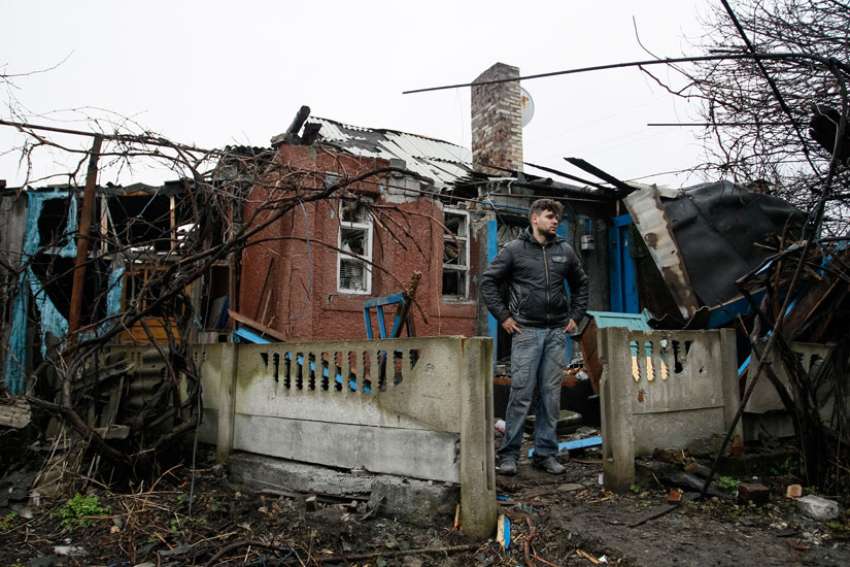“Through this exhibition we want to share with you our hopes, energy, and ideas for the future,” the introduction to the display reads. “We, as Ukrainians, have our rights and responsibilities – we want to be part of our nation that lives in peace and security.”
Displaying about 10 stories of individuals and families from different professions and situations, the exhibit shows the common theme of longing for home and the freedom to live a normal life.
“We are internally displaced people who left our homes, but this doesn’t make us different. We were, and are, citizens of Ukraine,” the introduction continues. “We don’t ask the state for anything more than our right to live and be treated the same as others. To have the possibility to work for ourselves and help build our country’s future.”
Launched by the British government through the British Embassy and the British Council in Ukraine, the exhibit was first opened in Kyiv in Nov. 2015 and has stopped in other places in Ukraine, as well as London and Brussels. It is in Rome Dec. 5-14.
The display consists of large photographs of individuals or families with their own messages superimposed.
Each story and message is unique, expressing the man or woman’s own particular struggles and fears – but through many of them is the same desire – not for charity, but for work, so that they can contribute to and thank their new communities.
Conflict erupted in Ukraine in Nov. 2013, when the former government refused to sign the Association Agreement with the European Union, leading to months of violent protests.
Tensions deepened in Feb. 2014, when the country’s former president was ousted following the protests, and a new government appointed. In March of that year, Ukraine’s eastern peninsula of Crimea was annexed by Russia, and pro-Russian separatists have since taken control of eastern portions of Ukraine.
More than 9,700 people, including civilians, have died in the fighting between Ukraine’s military and the separatists. Roughly 2 million others have been forced to flee due to violence and a lack of basic humanitarian necessities, such as food and medicine.
“They ask me ‘what is it like to lose your home?’” wrote Yana Cherkas, a mother of six. “How should I answer? I don’t know. I don’t have time to think about it. We have lived in five towns in six months. Everything’s destroyed.”
“I want to be home so badly,” she wrote. “I ask myself, does anybody want us. What for? We have no right to vote, no normal life. I just want to settle. With no need to go further, no need to ask anyone for help, no need to survive.”
“I say to myself: tomorrow is a new day, and everything will be fine. Everything will come together, it’s that now it’s difficult. It will get easier. Donetsk remains home for us and one day I dream of returning. But they hate us there fiercely, they hate us here politely.”
Though Cherkas and her family have had trouble settling in the villages, others say they have been welcomed by the people in Kyiv – although the government does nothing to assist them.
One is Olga Todorova, a graphic designer and volunteer from Stakhanov, in the Luhansk Oblast, which is controlled by the separatists. She said that since arriving in Kyiv, she and her family “have met kind people who helped us,” although the government “less so.”
“Our position is this,” she wrote: “if you can’t help, at least don’t hinder.”
“When you see total lawlessness and chaos, you don’t simply leave – you run,” she expressed. “The very beginning is the most difficult, the adaptation. When you think of what you had and what you left behind.”
“Over there, we were ‘Ukry,’ betrayers who left Luhansk to go to Ukraine. But we were luckier than most. I know seven people who were killed because of their pro-Ukrainian position. This is horrifying.”
Anzhelika Ostapenko, a pharmacist also from Luhansk, wrote about the fear of living and working in the middle of conflict, like a bomb that hit a nearby government building while she was working.
“At night I would come to my window, look at all these people with machine guns and realize – this is it, it cannot continue like this any longer.”
“When people shoot near your windows and your child starts trembling with fear, the only thing you can think of is how to save your family,” she wrote. “So we packed our children’s stuff, got on the train and left.”
She noted that people in Kyiv have accepted them very well, but other people have stayed behind in the east, either because of commitments or circumstances.
One is her mother: “she says that relocating at her age is like uprooting an old tree.” But for Ostapenko, “home is where my children are.”
“The only thing I ask now is to have the opportunity to earn money so that we can get a mortgage at normal interest rates,” she wrote. “The rest will follow. Everything else will mend in time.”
In the meantime, one young mother, Elena Lusenko, wrote as if speaking a word of encouragement to her young son: “You will have a wonderful and a very happy life.”
“You will never be an internally displaced person because it is impossible to lose what you have inside your heart. The most important thing is that we are together, where we are truly happy.”
(Story from the Catholic News Agency)


